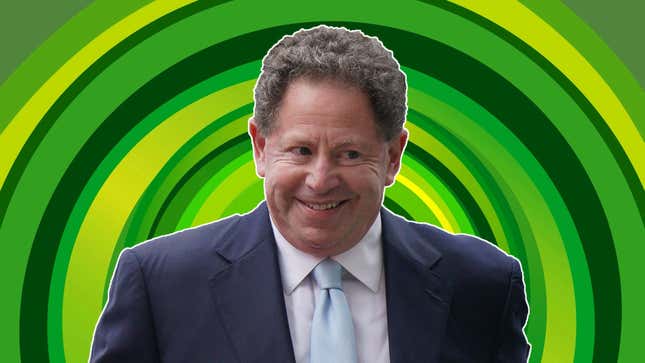
Longtime Activision Blizzard CEO, Bobby Kotick, is almost gone, but not quite yet. Nearly two years after over 1,000 of his employees called on the controversial executive to resign, Microsoft Gaming CEO Phil Spencer confirmed that Kotick will remain the head of the Call of Duty publisher until the end of 2023, to help with the transition as it begins officially merging with the tech giant.
“Bobby Kotick has agreed to remain in his role through the end of 2023, reporting directly to me, to ensure a smooth and seamless integration,” Spencer wrote in an October 13 email to staff. “We look forward to working together as a unified team and we will share more updates on our new organizational structure in the coming months.”
“I have long said that I am fully committed to helping with the transition,” Kotick wrote in his own email to Activision Blizzard employees. “Phil has asked me to stay on as CEO of ABK, reporting to him, and we have agreed that I will do that through the end of 2023. We both look forward to working together on a smooth integration for our teams and players.”
Kotick’s leadership at Activision has often been contentious, especially following a 2021 lawsuit by regulators in the state of California alledging a history of sexual harassment and discrimation at the company. Activision Blizzard has denied those claims and continues to fight the lawsuit in court. But the allegations and subsquent reporting became a catalyst for hundreds of employees at the company to speak out against the CEO, and even begin unionizing at some studios.
A November 2021 investigation by The Wall Street Journal alleged that Kotick was aware of serious sexual misconduct incidents at the company and did not always report them to the board of directors. Activision called the reporting misleading, but in the wake of the story gaming executives—including Sony’s Jim Ryan, Nintendo of America’s Doug Bowser, and Spencer himself—informed staff they were concerned about the allegations. The report also led over 1,000 Activision Blizzard employees to call for Kotick to resign amid large scale walkouts.
Instead, Microsoft swooped in to begin acqusition neogtiations. According to reporting by Bloomberg and The Wall Street Journal, the mounting calls for accountability and unease among some members of the board of directors were a factor in convincing Kotick to move ahead with selling Activision Blizzard. It’s a deal that now looks set to provide him with a nearly $400 million windfall in the sale of company stock.
Even prior to the sexual harassment and discrimation allegations against the company, which spurred Kotick to announce a series of initiatives to make Activision Blizzard a more safe and inclusive workplace, developers working under him have often been critical of the executive’s vision for aggressively monetizing franchises with sequels and pricey in-game items. The annual production of blockbuster Call of Duty games has been blamed for poor working conditions among quality assurance testers, and extended periods of overtime “crunch” across the teams making them.
“We see the progress that they’re making that was pretty fundamental to us deciding to go forward here,” Spencer said of Activision’s plans to improve workplace culture in the wake of the California lawsuit, back when the merger was first announced in January 2022. More recently, Kotick had controversial comedian and former late night host James Corden come to Activision to interview him earlier this week. He told the Cats star that the company had a “magic” culture, and it was that magic that first attracted Microsoft to the acquisition in the first place.